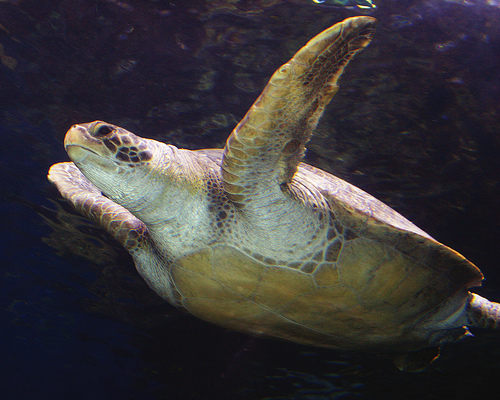
Ralphs
Discount tickets available at Ralphs for a limited time
With an optimistic tone and examples of people coming together to create new solutions around the world, the film recruits viewers to get involved.

October 24, 2017
The Aquarium of the Pacific in Southern California is debuting a new film designed to inspire viewers to take action in response to climate change called The Time is Now, The Future is Here. The film uses examples of people of all ages and various backgrounds around the world developing sustainable solutions in the face of a changing climate, from high school students who learned to make biodiesel from algae to farmers in Bangladesh growing different crops to adapt to sea level rise. Richard Somerville, a leading climate scientist based at the Scripps Institution of Oceanography at the University of California, San Diego, serves as a guide to climate change basics in the film. “Burning fossil fuels has given us a lot of success, but it is also causing climate change. We must reduce emissions and provide renewable electric power to the developing world, and we need to do it soon,” he says.
The film, produced in-house by the Aquarium with funding from Charlotte and Allen Ginsburg, is one of the outputs from a forum cosponsored by the Aquarium and American Honda Motor Company. The forum gathered climate scientists and social scientists from across the country to develop strategies to get the public to act on climate change. The strategies developed by the forum participants, including the film, will be tested at the Aquarium with its visitors. The Time is Now, The Future is Here will play daily in the Aquarium’s Ocean Theater starting October 27 and is included with Aquarium admission.
While the film acknowledges the dramatic impacts of climate change and the urgent need to act to address its impacts, it emphasizes that humanity has the ingenuity and rapidly evolving technologies to be effective in helping communities become resilient to climate change. The film is narrated by Aquarium President and CEO Jerry Schubel. “While we can work to limit the effects of climate change, we are already at a point where we will need to adapt to its impacts, including water shortages and drought, rising sea levels, and extreme weather. This principle is known as climate adaptation and more and more people around the world are beginning to realize that they have the power and tools to make a difference,” Schubel says.
The film features interviews with several experts on climate change and sustainability. Somerville sets the stage describing the driving forces behind climate change and what must be done to address it. Per Espen Stoknes, a psychologist and economist from the Norwegian Business School in Norway, promotes alternatives to burning fossil fuels, like solar and wind power and electric-powered vehicles. And Francisco Ayala, professor of biological sciences, philosophy, and logic and the philosophy of science at University of California, Irvine, advocates for curbing population growth, more efficient use of land and water resources, and the importance of education for women.
The projects highlighted in the film hail from locations as varied as urban San Diego, the coasts of Indonesia, and coastal areas in Bangladesh. The film introduces the biodiesel club based at Castle Park High School in Chula Vista, California, led by Robert Pomeroy, professor of chemistry and biochemistry at the University of California, San Diego. It also highlights a program that brings elementary students to San Diego’s Manzanita Canyon to conduct invasive plant and trash removal, ecosystem monitoring, and other conservation work. In Bangladesh, community-based agriculture projects adapted to rising sea levels are the focus. A project to restore coastlines in Indonesia conducted as a partnership between students at University of California, Davis, and local community members shows how international collaborations can find success from both an economic and environmental perspective.
In the film’s final scenes, Somerville explains the need to provide technology and finance to the developing world to establish renewable sources of energy and better education on the issue of climate change through schools and mass media to help the public understand the problem and how to solve it. The film closes with the message that it is possible to be successful in addressing climate change, but it will take billions of people coming together to create a better future for all.
The Aquarium has produced many award-winning films in-house for a variety of formats. Short films play daily in the Aquarium’s Ocean Theater and are projected on the walls of the Great Hall, and shows formatted for NOAA’s Science on a Sphere play on rotation in the Aquarium’s Ocean Science Center. In 2014 the Aquarium’s film Descent into the Depths was a finalist in the Blue Ocean Film Festival’s exploration category. In 2016 four Aquarium films and videos earned silver and bronze Telly Awards.
In 2016 the Aquarium produced a film based on its Vanishing Animals exhibit examining how human activity, including climate change, has an impact on animal extinctions for its Ocean Theater. Narrated by actor Anthony LaPaglia, the Vanishing Animals film was produced in house using footage from Alucia Productions and original music by Edward Freeman and Marta Victoria of Icarus Studios. The Aquarium also regularly creates content including films, exhibits, and programs for the National Oceanic and Atmospheric Administration’s Science on a Sphere® to help connect the public with science and policy issues on topics ranging from sea level rise to extreme weather. “The Aquarium of the Pacific is committed to empowering the public to prepare for climate change impacts, from those happening now to those expected in the future,” said Dr. Schubel. “We will continue to develop new exhibits and films like The Time is Now to help people better understand their role in tackling this challenge.”

Discount tickets available at Ralphs for a limited time